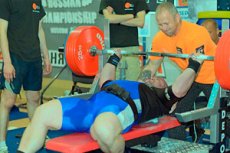Nye publikasjoner
Intens trening reduserer aktiviteten og kroppstemperaturen, noe som bidrar til vektøkning
Sist anmeldt: 02.07.2025

Alt iLive-innhold blir gjennomgått med medisin eller faktisk kontrollert for å sikre så mye faktuell nøyaktighet som mulig.
Vi har strenge retningslinjer for innkjøp og kun kobling til anerkjente medieområder, akademiske forskningsinstitusjoner og, når det er mulig, medisinsk peer-evaluerte studier. Merk at tallene i parenteser ([1], [2], etc.) er klikkbare koblinger til disse studiene.
Hvis du føler at noe av innholdet vårt er unøyaktig, utdatert eller ellers tvilsomt, velg det og trykk Ctrl + Enter.

Trening anbefales ofte som en effektiv strategi for vekttap. En nylig dyrestudie utført ved Universitetet i Tsukuba fant imidlertid at intens trening kan redusere påfølgende fysisk aktivitet og kroppstemperatur, noe som til slutt kan bidra til vektøkning. Denne observasjonen kan skyldes forstyrrelser i døgnrytmen til stresshormonet kortikosteron og kan forstyrre de synkrone effektene av fysisk aktivitet og kroppstemperatur.
Trening har mange helsefordeler, men effekten på vekttap er noen ganger mindre enn forventet. Dette fenomenet kan være sekundært til en reduksjon i fysisk aktivitet etter trening, men mekanismen er ikke fullt ut forstått.
Stresshormonet kortikosteron følger en døgnrytme, der det er lavt før søvn og når toppen ved oppvåkning, og det regulerer nivåene av fysisk og mental aktivitet. Forskerne antok derfor at selv en enkelt økt med høyintensiv trening kunne forstyrre denne rytmen, noe som førte til en reduksjon i fysisk aktivitet og varmeproduksjon, og reduserte effekten av vekttap.
For å teste denne hypotesen ble musene delt inn i tre grupper: høyintensiv trening, moderat intensitetstrening og hvile. Fysisk aktivitet og kroppstemperatur, som er en indikator på varmeproduksjon før og etter trening, ble overvåket. Studien ble publisert i tidsskriftet Medicine & Science in Sports & Exercise.
I gruppen som fikk høyintensitetstrening, var både fysisk aktivitet og kroppstemperatur etter trening betydelig redusert til tross for ingen endring i matinntaket, noe som resulterte i vektøkning.
Dessuten observerte forskerne en forstyrrelse i synkroniseringen mellom fysisk aktivitet og kroppstemperatur. Sammen bekreftet de en positiv korrelasjon om at relativt lave kortikosteronnivåer i blodet under våkenhet var assosiert med mindre fysisk aktivitet.
Funnene tyder på at en enkelt økt med høyintensitetstrening kan forstyrre døgnrytmen til kortikosteron, noe som fører til redusert fysisk aktivitet, kroppstemperatur og vektøkning.
Denne studien fremhever viktigheten av å ikke bare vurdere kaloriforbrenningen under trening, men også påfølgende aktivitetsnivåer og døgnrytme når man utformer treningsprogrammer for effektivt vekttap.
